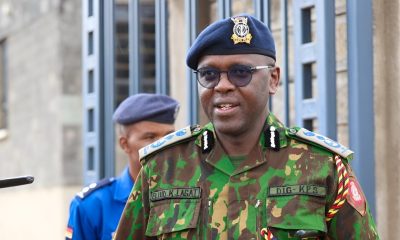Investigations
DCI Boss Names Central Police OCS as Prime Suspect in Ojwang Death
“It has been confirmed that before the booking, the report office personnel called the OCS, who declined to book the suspect,” Amin told senators.

Directorate of Criminal Investigations boss Mohammed Amin identifies Officer Commanding Station Samson Talaam as main suspect in custody death of social media influencer
The Director of Criminal Investigations Mohammed Amin has named Officer Commanding Station Samson Talaam of Central Police Station as the prime suspect in the death of Albert Ojwang, the social media influencer who died in police custody on June 8.
Speaking before the Senate on Wednesday, Amin revealed that investigations had uncovered troubling circumstances surrounding Ojwang’s booking at the Nairobi station, directly implicating the senior officer in the death.
“It has been confirmed that before the booking, the report office personnel called the OCS, who declined to book the suspect,” Amin told senators.
“Talaam is the Officer Commanding Central Police Station, and from the totality of things, he should be treated as a prime suspect in the matter.”
The revelation marks a significant development in the high-profile case that has sparked national outrage and calls for police accountability.
Ojwang, a teacher and popular social media influencer, was arrested at his home in Homa Bay County on Friday on allegations of cybercrime before being transferred to Nairobi, where he died three days later.
The DCI boss’s testimony came as a government post-mortem examination contradicted the initial police report claiming Ojwang died after hitting his head against a cell wall.
Government pathologist Dr. Bernard Midia found evidence of multiple injuries inconsistent with self-infliction.
“The bleeds that we found on the scalp, on the skin of the head were spaced, including on the face, sides of the head, and the back of the head,” Dr. Midia explained.
“When we tie this with other injuries that are well spread on parts of the body… this is unlikely to be self-inflicted injury.”
The pathologist noted that injuries from hitting a wall would typically present with frontal bleeding and a distinct pattern, neither of which were present in Ojwang’s case.
Controversial Cross-County Transfer
Amin also defended the controversial decision to transfer Ojwang from Homa Bay to Nairobi, citing the national jurisdiction of cybercrime offenses.
He dismissed suggestions that a court order was required for the transfer.
“The ordinary place of trial is determined by where the crime was committed. In this case, we believe the offence was committed in Nairobi, though the arrest happened in Homa Bay,” he explained.
“We do not require a court order to move a suspect from one police jurisdiction to another.”
The DCI boss confirmed that Ojwang was transported directly from Homa Bay to Central Police Station in a government vehicle, with GPS tracking verifying the route.
He noted that the suspect was treated humanely during the journey, even being provided refreshments when requested.
Deputy IG’s Role Clarified
Addressing speculation about Deputy Inspector General Eliud Lagat’s involvement, Amin clarified that Lagat had filed a formal complaint with the DCI following “very serious allegations” made against him online.
“The complaint by Lagat followed due process, and there was no preferential treatment,” Amin stated. “Throughout our investigation, he never interfered with the investigations whatsoever.”
Missing CCTV Evidence
The investigation has been hampered by the absence of CCTV footage from both the arrest location and Central Police Station.
Amin explained that Magwengo Police Station in Homa Bay, where Ojwang was initially held, is a recently upgraded facility that lacks surveillance systems.
Questions have also been raised about potential tampering with CCTV systems at Central Police Station, though Amin did not directly address these concerns in his Senate testimony.
Kenya Insights allows guest blogging, if you want to be published on Kenya’s most authoritative and accurate blog, have an expose, news TIPS, story angles, human interest stories, drop us an email on [email protected] or via Telegram
-

 Grapevine1 week ago
Grapevine1 week agoAlleged Male Lover Claims His Life Is in Danger, Leaks Screenshots and Private Videos Linking SportPesa CEO Ronald Karauri
-

 Lifestyle2 weeks ago
Lifestyle2 weeks agoThe General’s Fall: From Barracks To Bankruptcy As Illness Ravages Karangi’s Memory And Empire
-

 Grapevine5 days ago
Grapevine5 days agoRussian Man’s Secret Sex Recordings Ignite Fury as Questions Mount Over Consent and Easy Pick-Ups in Nairobi
-

 Investigations2 weeks ago
Investigations2 weeks agoEpstein Files: Sultan bin Sulayem Bragged on His Closeness to President Uhuru Then His Firm DP World Controversially Won Port Construction in Kenya, Tanzania
-

 Investigations2 days ago
Investigations2 days agoMulti-Million Dollar Fraud: Three Kenyans Face US Extradition in Massive Cybercrime Conspiracy
-

 Investigations2 weeks ago
Investigations2 weeks agoEpstein’s Girlfriend Ghislaine Maxwell Frequently Visited Kenya As Files Reveal Local Secret Links With The Underage Sex Trafficking Ring
-

 News2 weeks ago
News2 weeks agoState Agency Exposes Five Top Names Linked To Poor Building Approvals In Nairobi, Recommends Dismissal After City Hall Probe
-

 Business1 week ago
Business1 week agoM-Gas Pursues Carbon Credit Billions as Koko Networks Wreckage Exposes Market’s Dark Underbelly





























